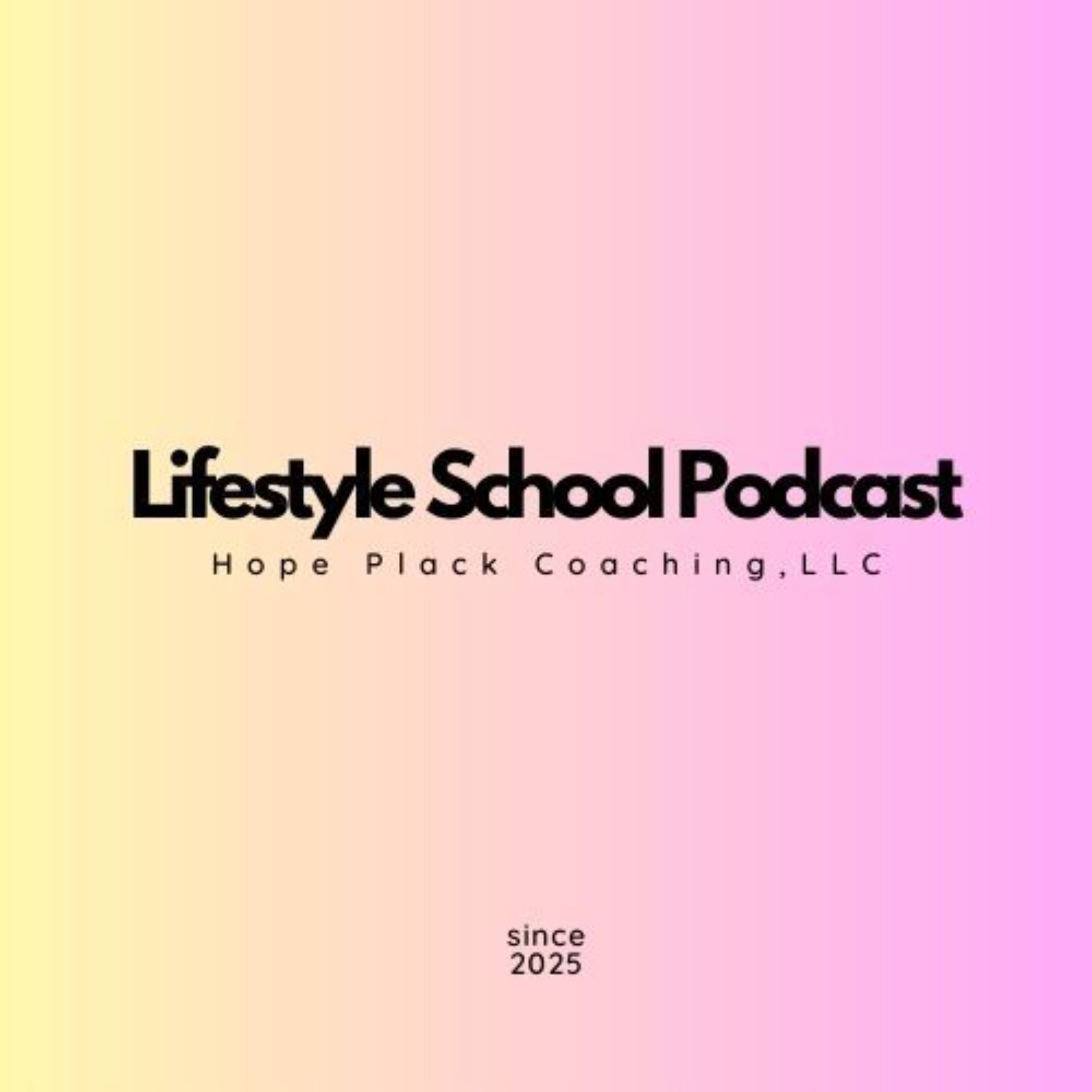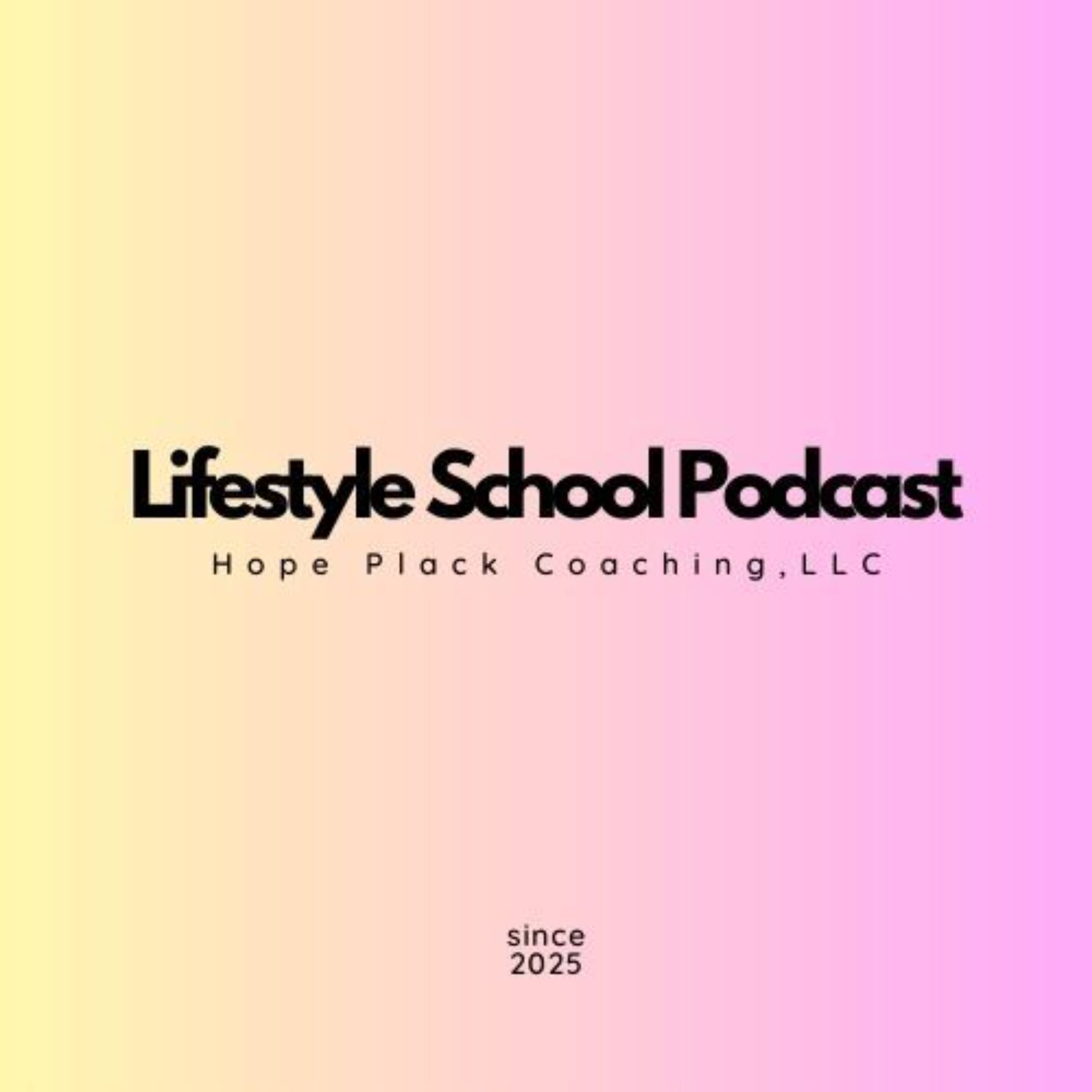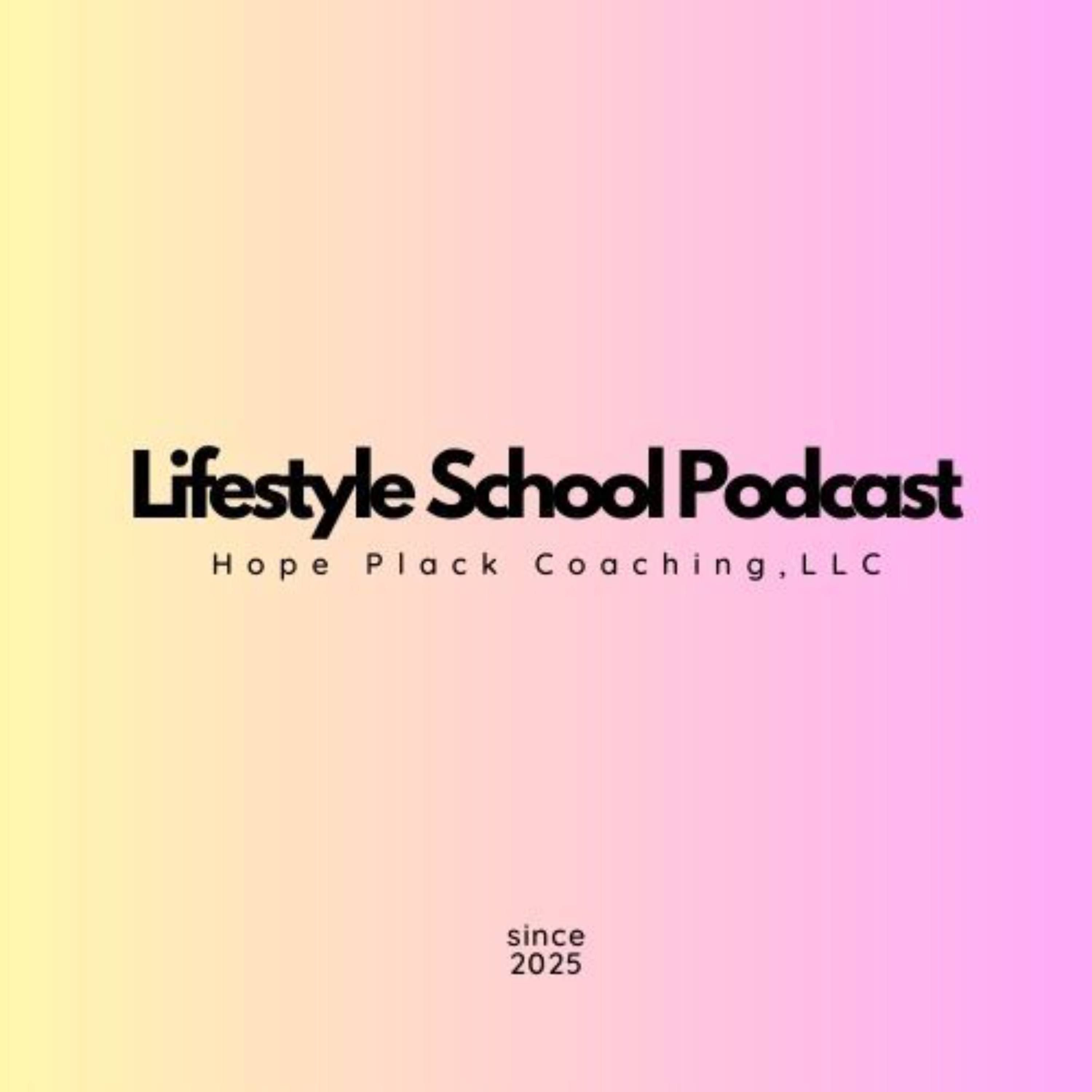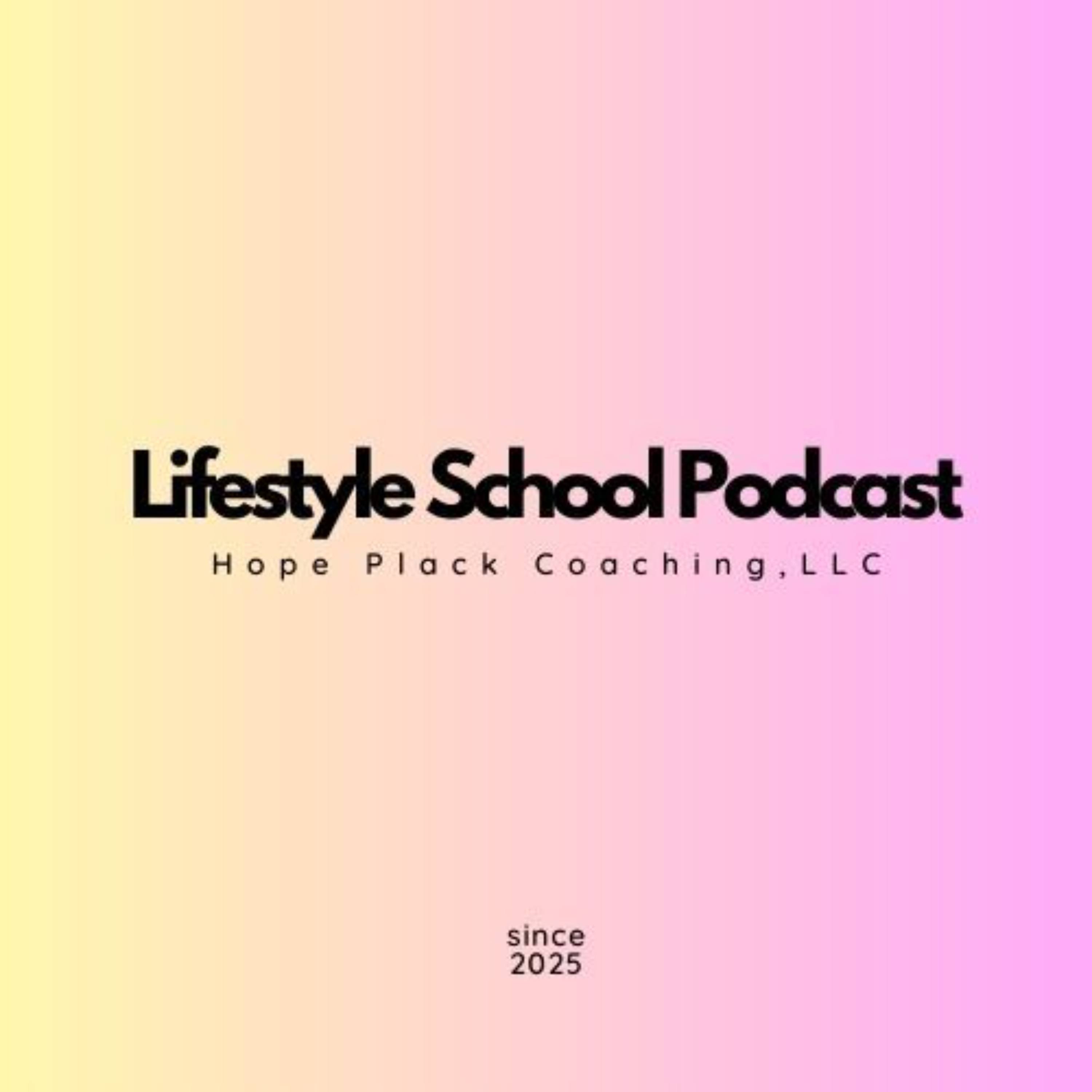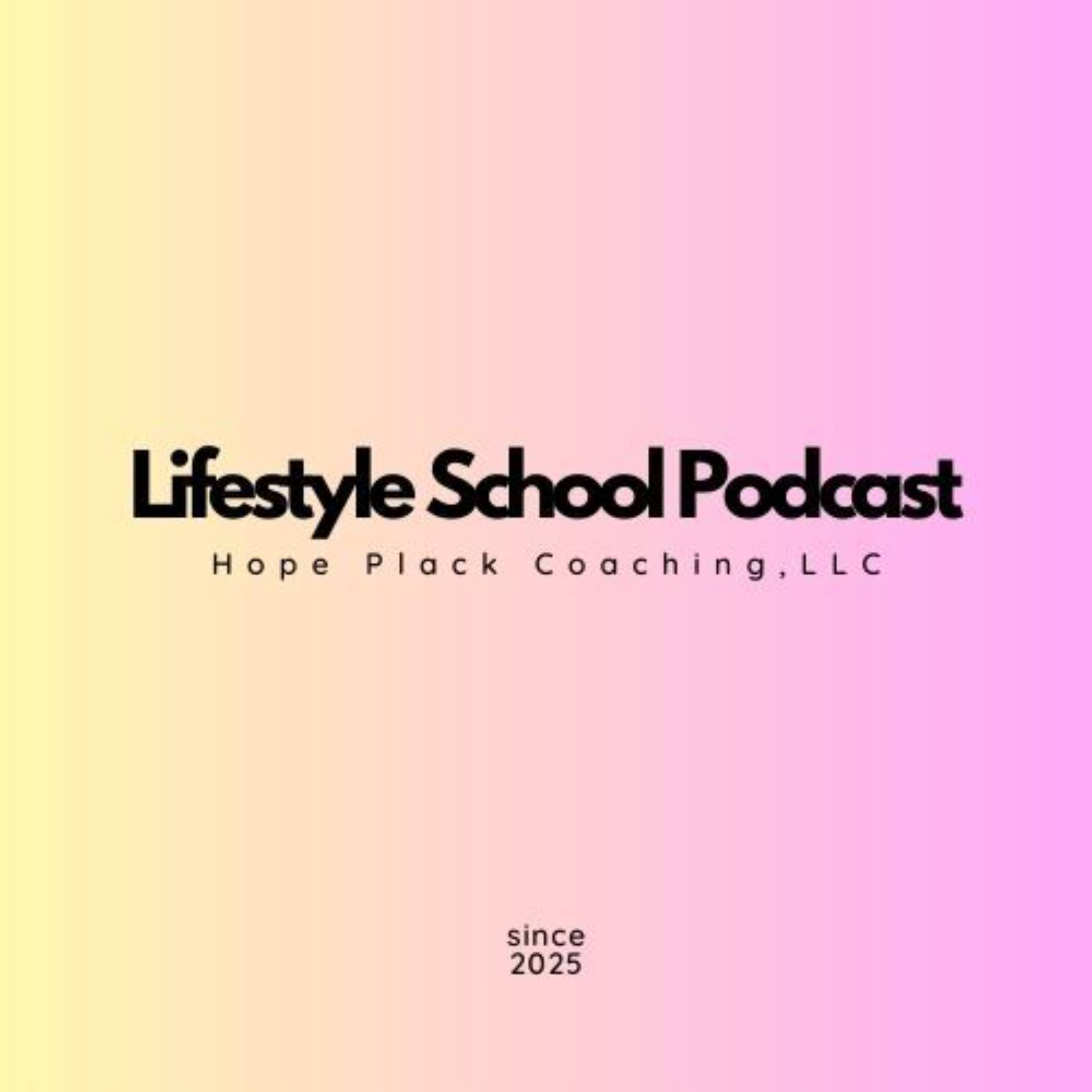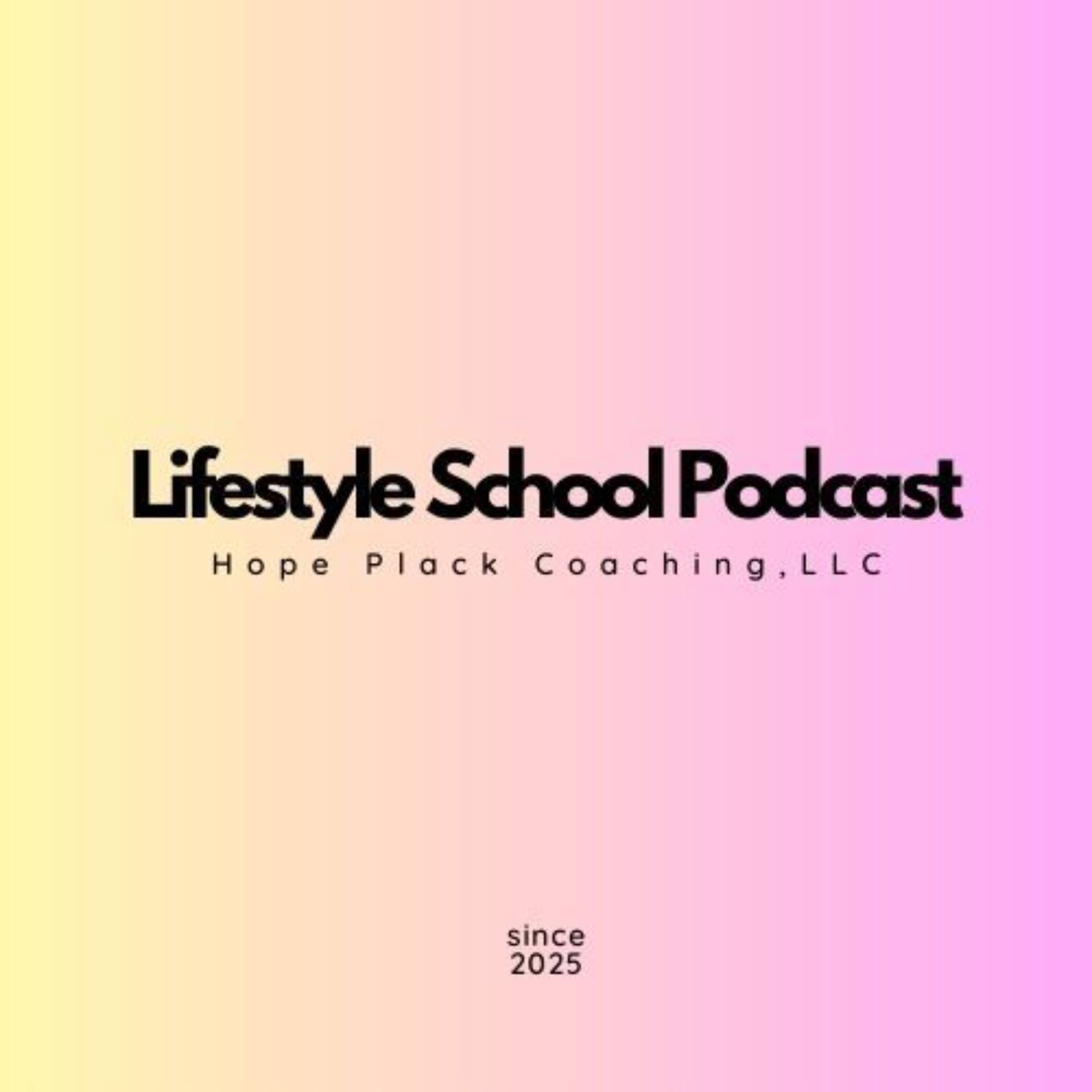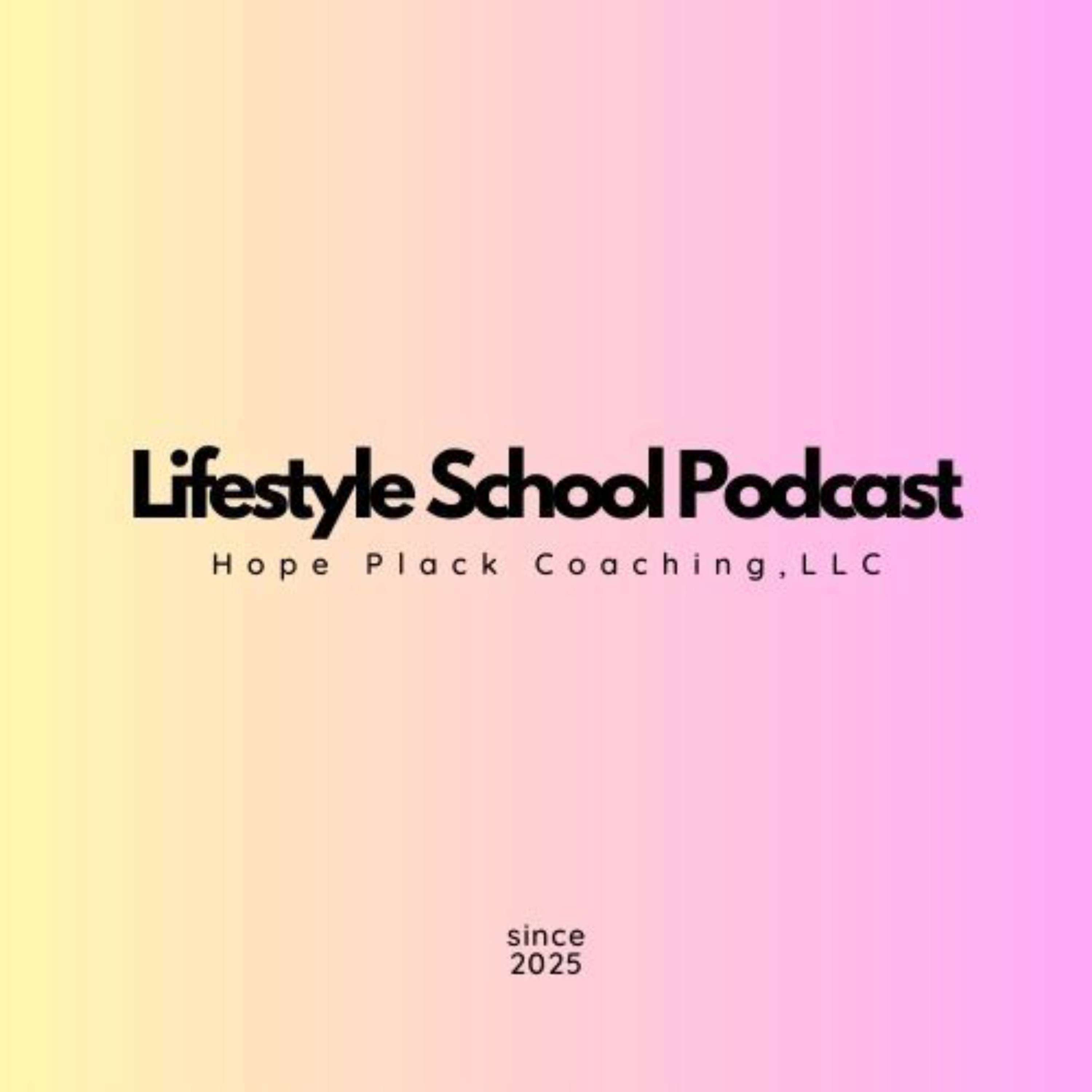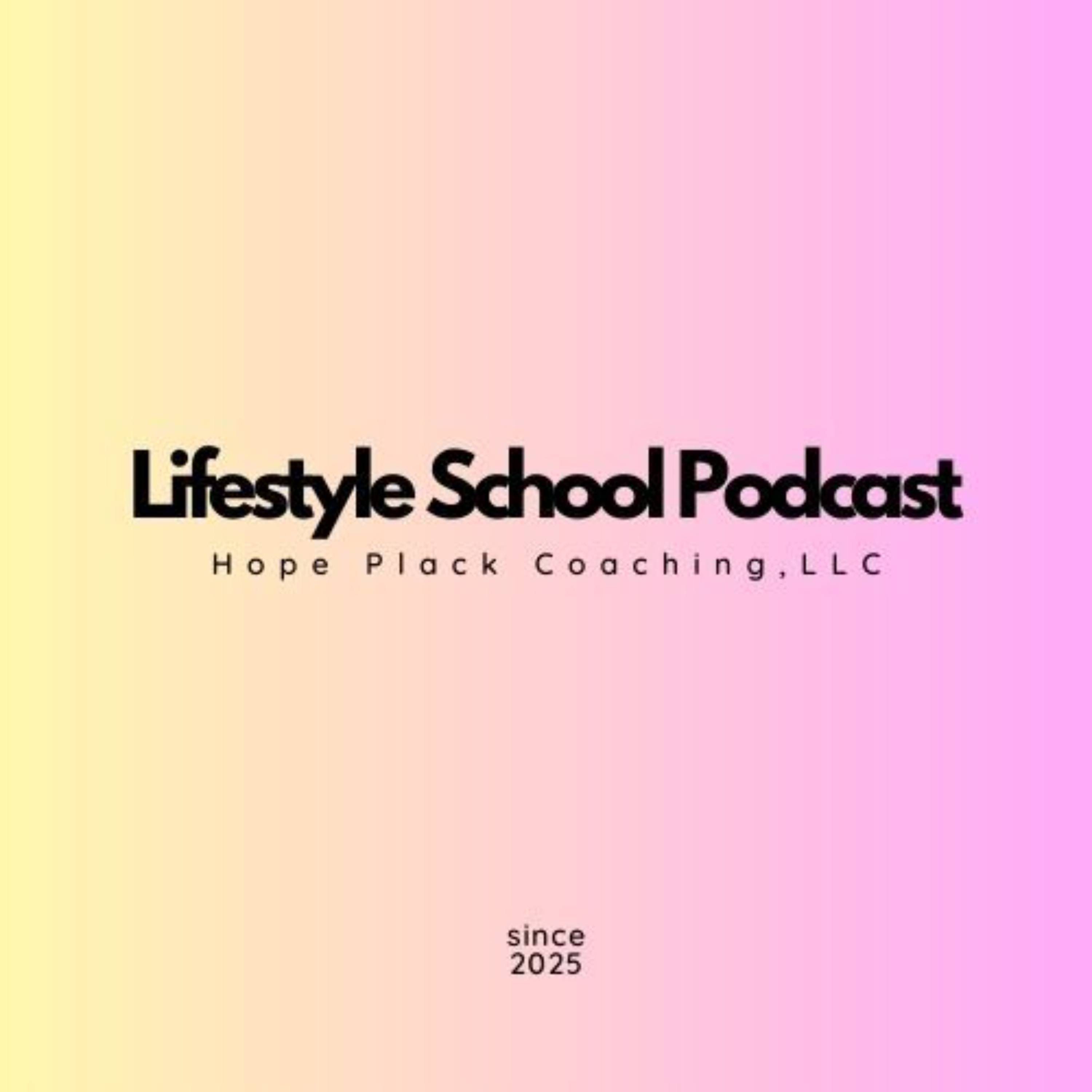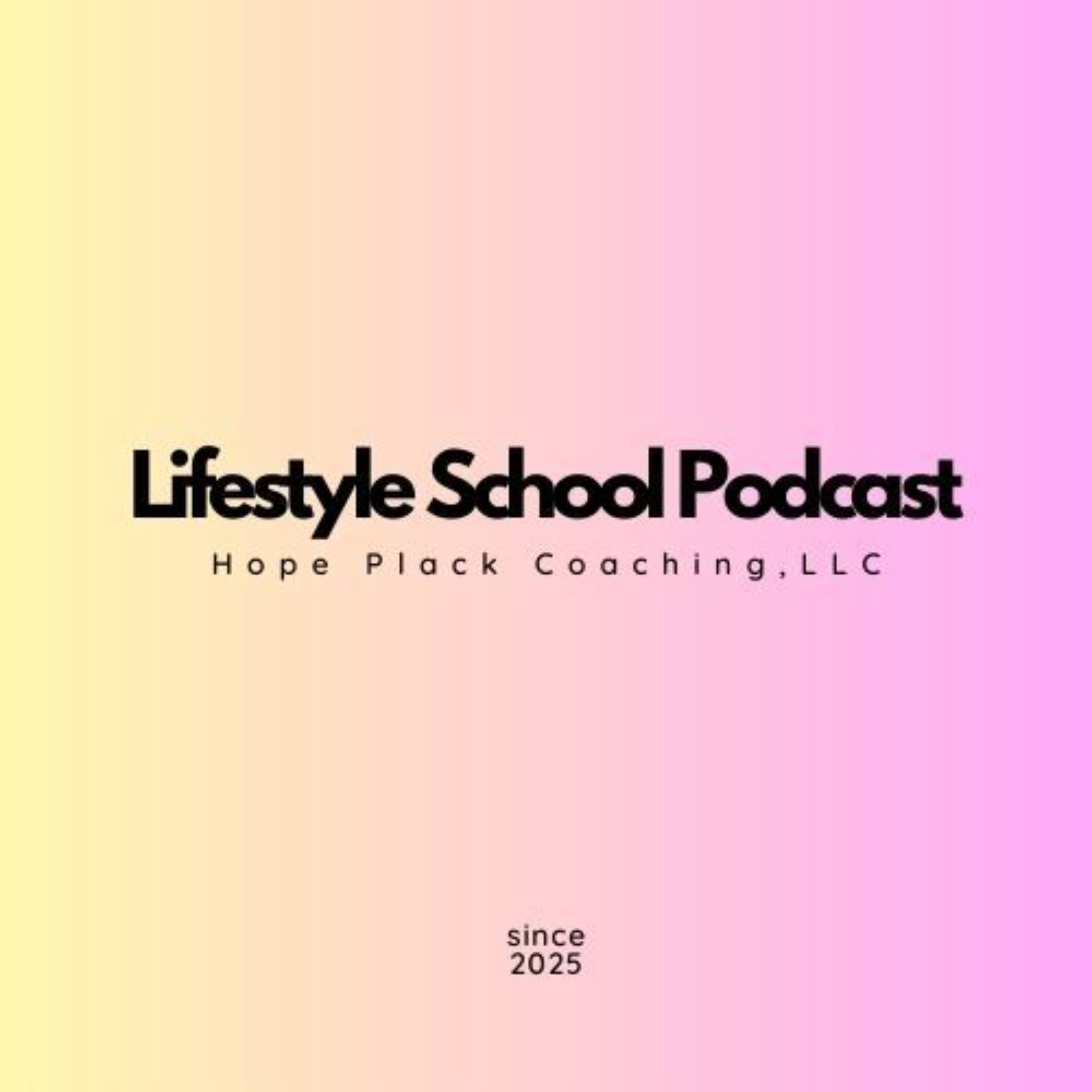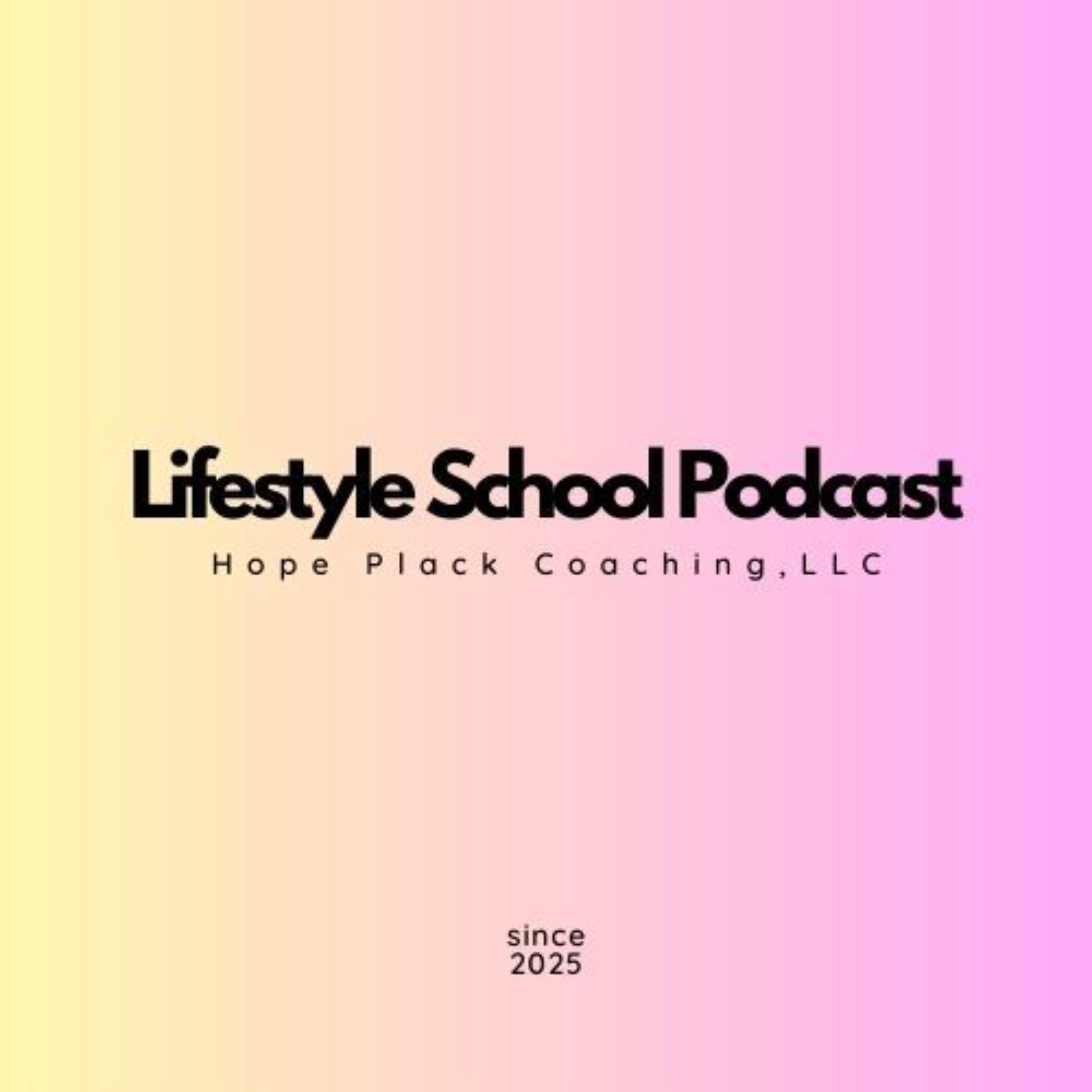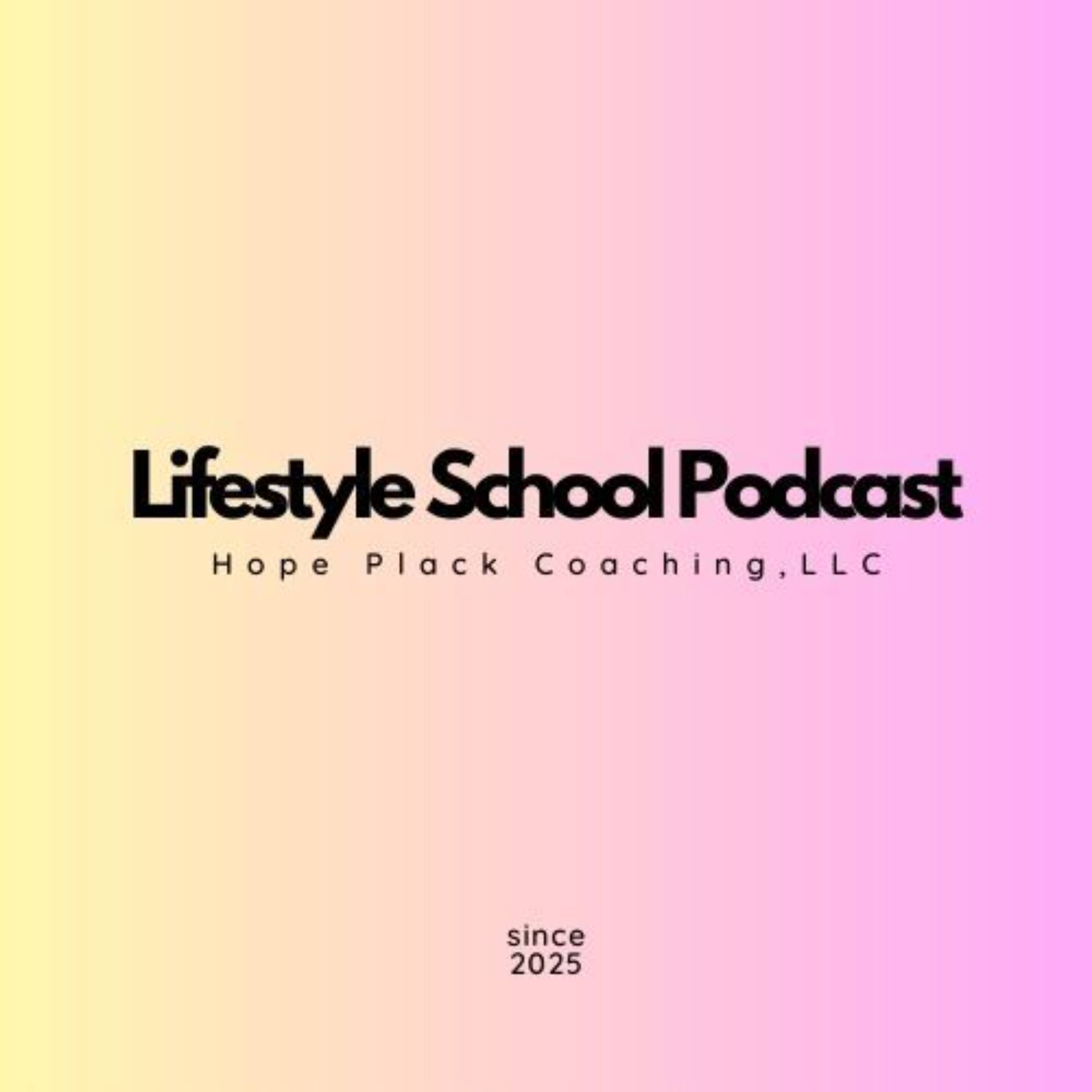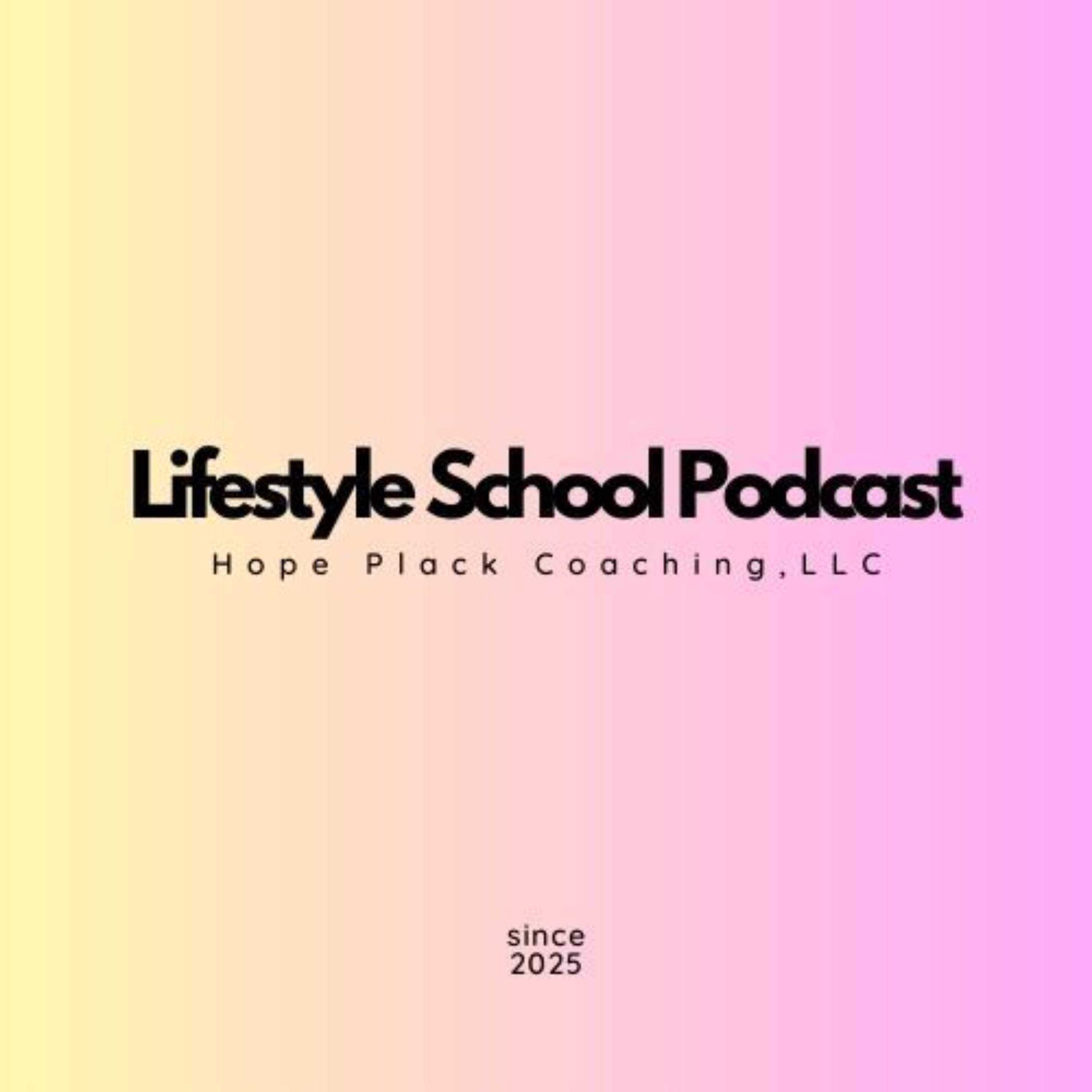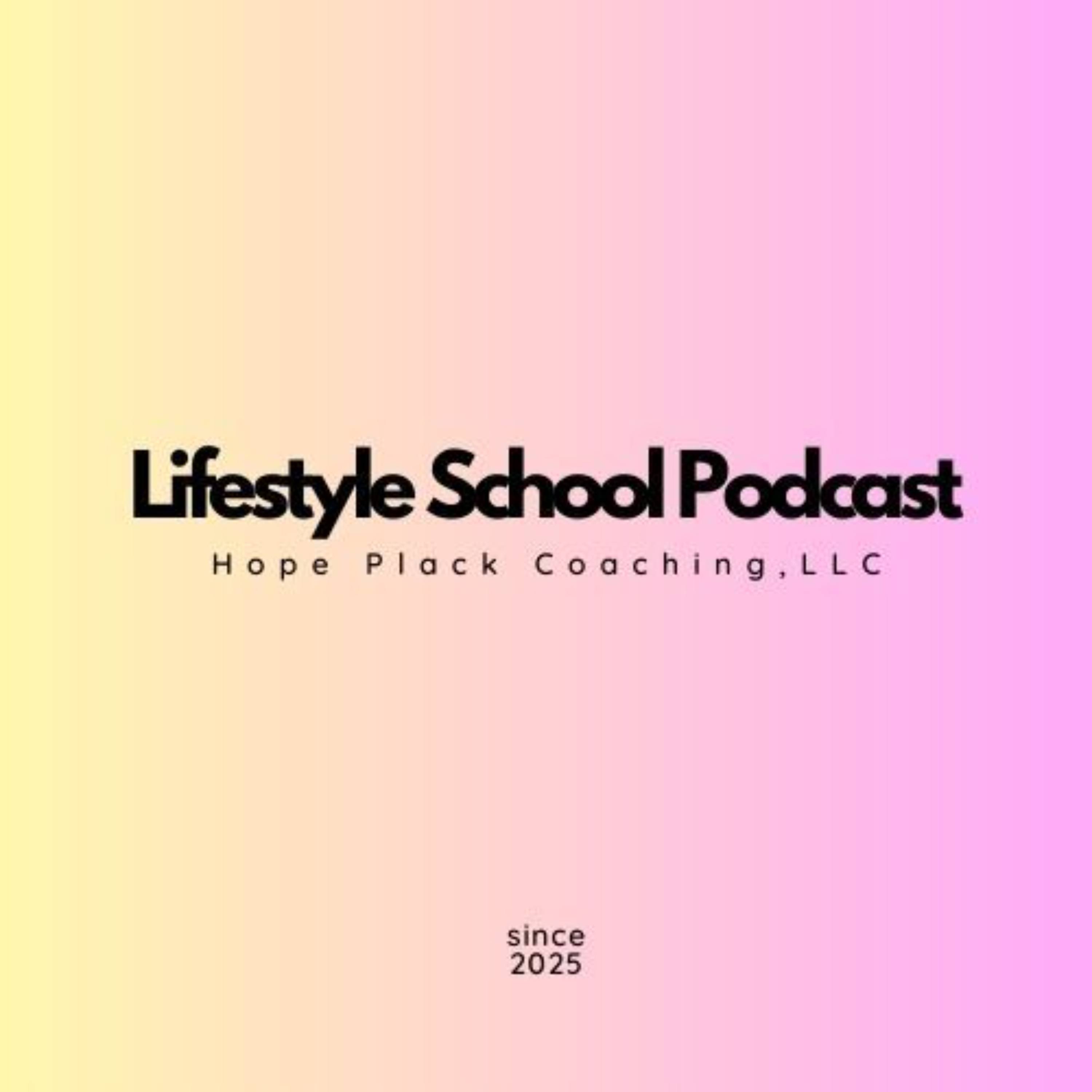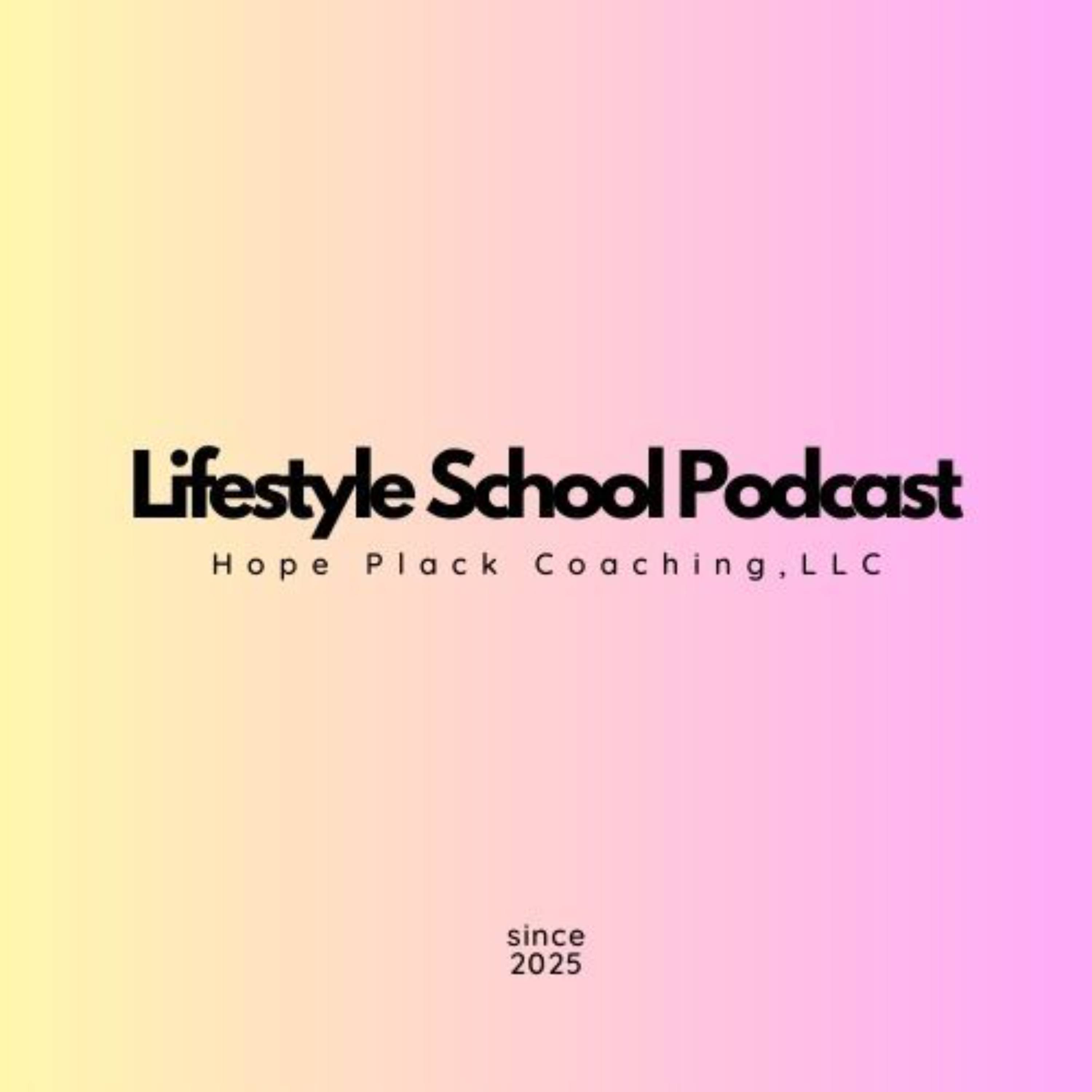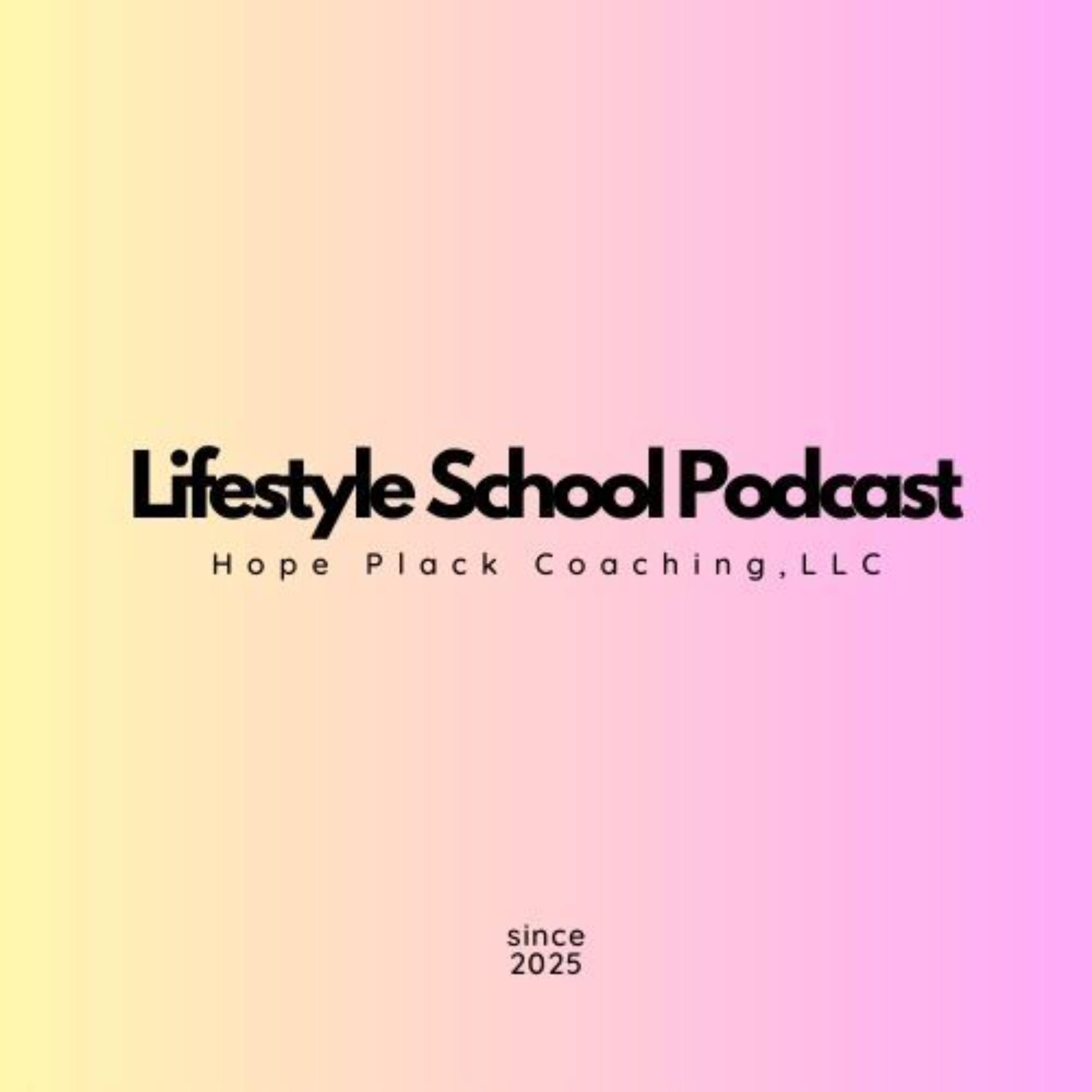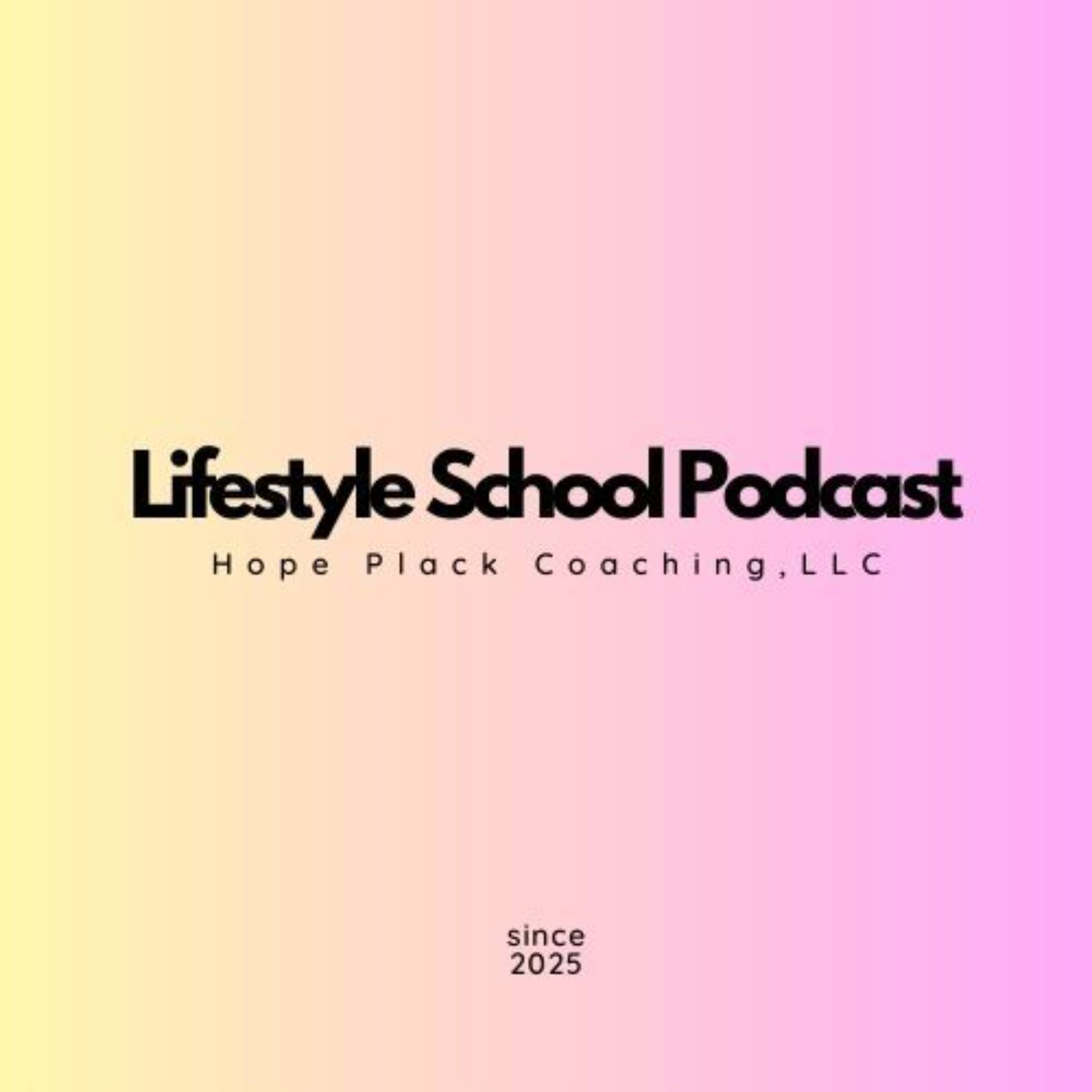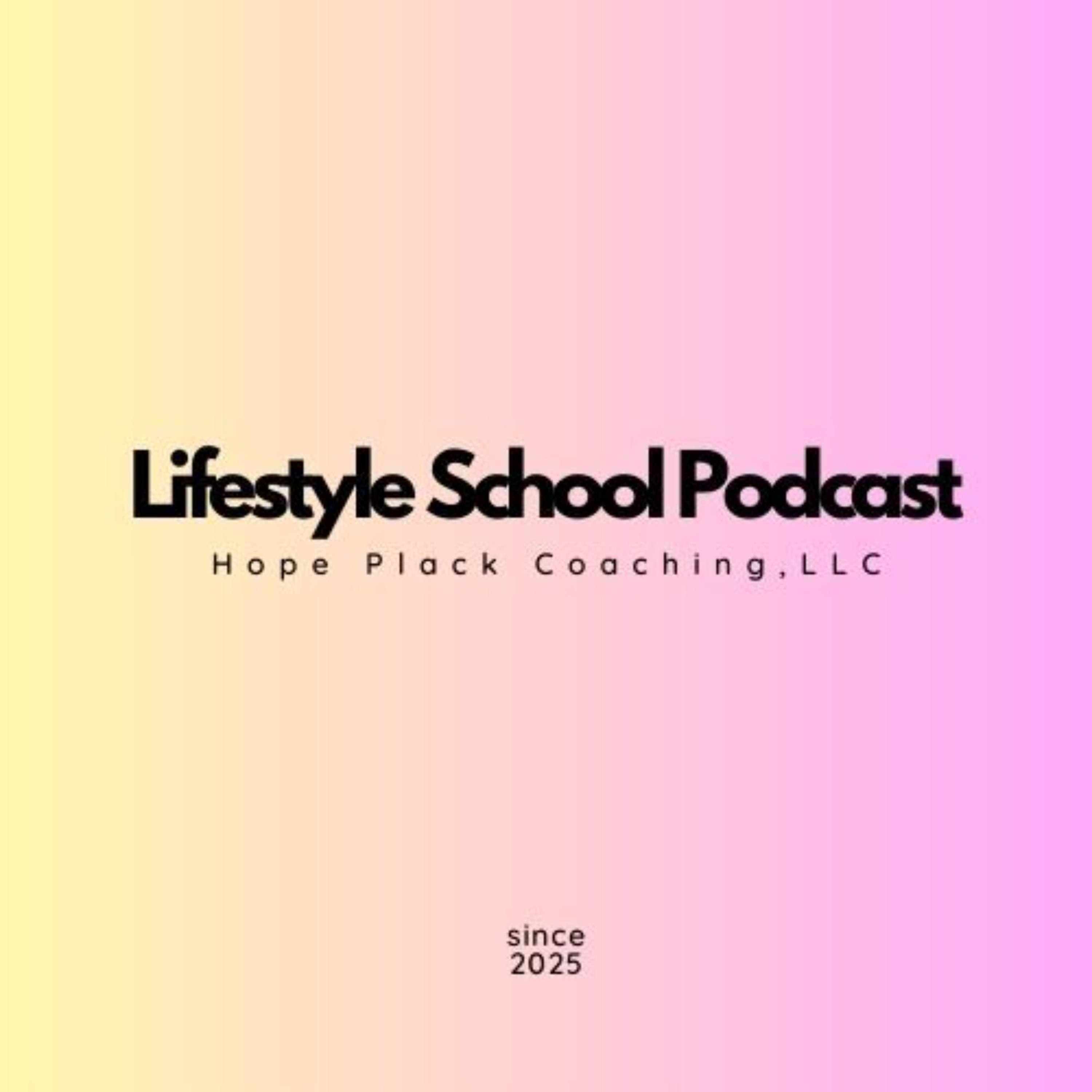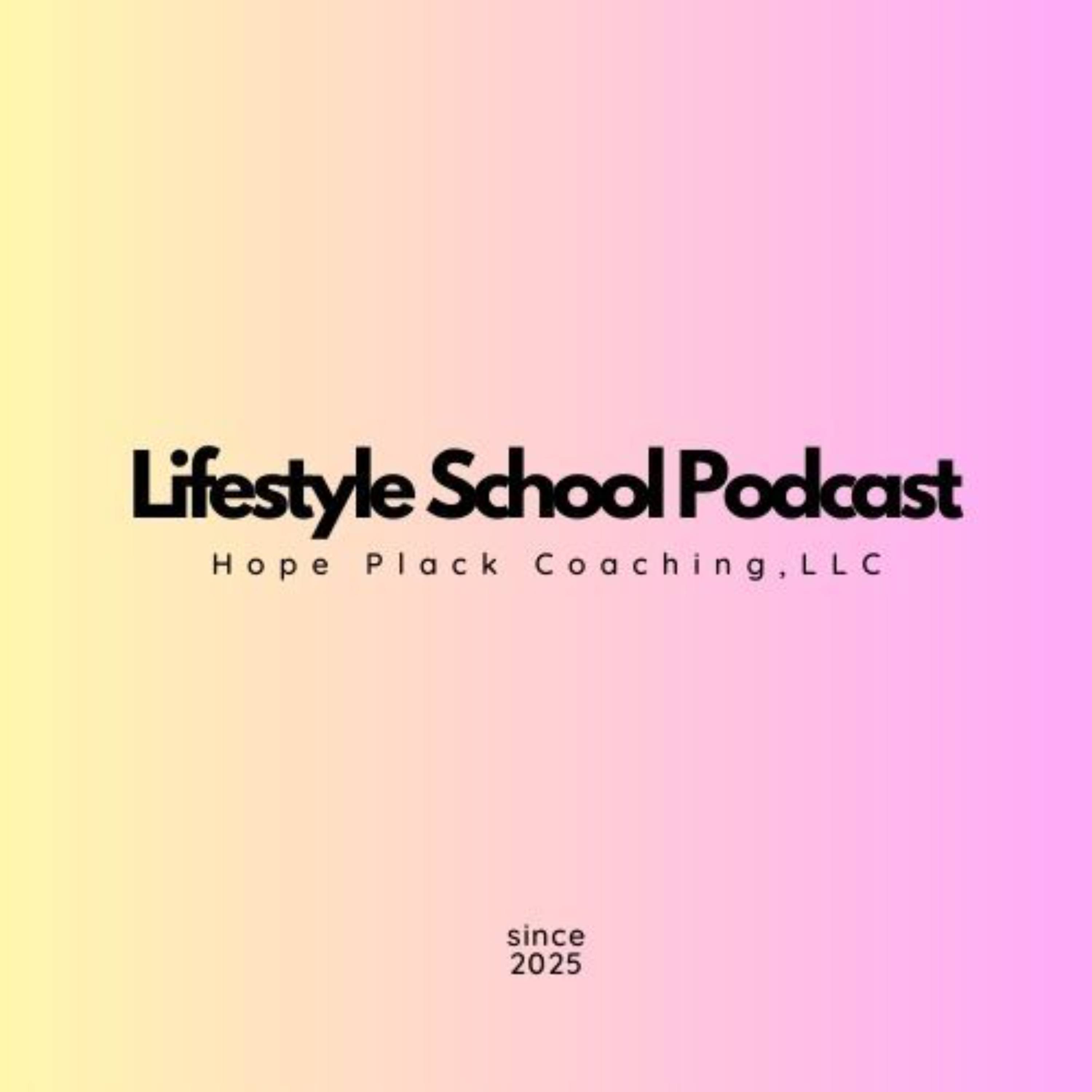Discover Lifestyle School Podcast
Lifestyle School Podcast

Lifestyle School Podcast
Author: Hope Plack
Subscribed: 0Played: 0Subscribe
Share
Description
The Lifestyle School Podcast was created to help you design a life you love while achieving the health results you’ve always wanted.
We focus on how small, sustainable changes to your lifestyle can lead to transformative improvements in both your health and overall well-being.
It’s time to step off the diet-and-shame treadmill and put practical systems in place so you can reach your health goals effortlessly—on autopilot.
50 Episodes
Reverse
Episode Summary:In today’s episode, Hope breaks down one of the most freeing mindset shifts you can make around anxiety: understanding it as a signal from your body, not a fixed part of your identity. You’ll learn how anxiety communicates unmet needs, how metabolic health influences emotional stability, and how to retrain your nervous system so you don’t feel controlled by old patterns.
In This Episode, You’ll Learn:
Why anxiety is a biological response, not a personality trait
How blood sugar instability, caffeine, sleep, inflammation, and under-eating contribute to anxiety
The difference between experiencing anxiety and identifying as “an anxious person”
What your body might be trying to tell you when anxiety shows up
How cultural norms and overstimulation keep many women in chronic fight-or-flight
Why “false alarms” happen in the nervous system and how to retrain them
How avoidance amplifies anxiety — and what happens when you finally face the thing you’ve been running from
Practical, long-term tools for reducing anxiety through lifestyle, boundaries, routine, and metabolic stability
Key Takeaway:Anxiety isn’t who you are — it’s your body communicating with you. When you stop internalizing it and start interpreting it, you gain the power to respond instead of react.
If You Enjoyed This Episode:Share it with a friend who needs this reminder.And make sure you’re subscribed so you never miss a new episode of Lifestyle School.
In today’s episode, Hope dives into the real internal work behind lasting health and weight transformation — the shedding process. Before you become a healthier, stronger, more aligned version of yourself, you have to release the beliefs, identities, habits, and patterns that belong to the old you.
This episode will help you understand why change feels so emotional, why resistance is normal, and how shedding the old self is the doorway to becoming your most confident, grounded, healthy self.
What You’ll Learn:
Why real change requires an identity shift — and why that shift often feels like grief
How childhood beliefs, family patterns, and cultural messages shape your relationship with health
Why emotional eating is a coping pattern, not a flaw — and how shedding it brings emotional clarity
How your growth can shift relationships (and why that’s not a bad thing)
Why routines, structure, and boundaries matter more than “motivation”
The power of letting go of quick-fix expectations
What the “rebirth” phase feels like once you’ve shed the old version of yourself
Perfect For:
Anyone ready to transform their health from the inside out, especially if you feel like you’re “between versions” of yourself right now.
Share This Episode
If this episode resonated, send it to someone who needs encouragement on their transformation journey.
Episode Summary
In this episode, Hope breaks down the real reason so many women feel exhausted, overwhelmed, foggy, irritable, and unlike themselves — sometimes years after giving birth. It’s called postnatal depletion, and it’s far more common (and more serious) than most women realize.
Hope explains what postnatal depletion is, why it’s not “just motherhood,” and how pregnancy, birth, breastfeeding, sleep loss, stress, and modern lifestyle demands create a level of physiological and emotional depletion that rarely gets addressed.
You’ll learn what’s actually going on inside the body — from nutrient loss and hormone disruption to nervous system overload and metabolic instability — and how to finally start rebuilding your energy, mood, metabolism, and sense of self.
What You'll Learn
What postnatal depletion really is and why it can last for years
How pregnancy and breastfeeding create deep nutrient deficiencies
Why postpartum hormones don’t “bounce back” without support
How matrescence rewires the brain and increases sensitivity
Why modern motherhood is a perfect storm for chronic exhaustion
The most common signs of long-term depletion
How unresolved depletion affects metabolism, weight, mood, and hormones
What real recovery looks like — and why it starts with restoration, not restriction
Key Takeaway
You are not broken or behind.You are depleted — and depletion is something you can rebuild from. With the right foundation, you can feel like yourself again.
Listen + Share
If this episode resonates with you, share it with a mom who needs to feel seen, validated, and supported.
Episode Summary
As the New Year approaches, the detox and cleanse marketing machine kicks into high gear — promising fast weight loss, instant energy, glowing skin, and a “fresh start.” But most of these trendy programs don’t detox your body at all. In fact, many of them can cause more harm than good.
In this episode, Hope breaks down the real detoxification systems of the human body, explains why so many detox programs backfire, and teaches you how to support your detox pathways naturally — without extreme fasting, sugar-loaded juices, laxative teas, or punishing protocols.
If you want clarity, energy, and a true reset for the New Year, this episode will give you the science, the strategy, and the confidence to do it the right way.
What You’ll Learn in This Episode
✨ The Truth About Detox Marketing
Why detox trends explode in January
How wellness companies prey on discomfort and hope
The false promises behind popular cleanses and flushes
✨ The Real Detox Systems of Your Body
You’ll learn exactly how your body detoxes through:
The Liver (Phase 1, Phase 2, Phase 3 detox pathways)
The Gut (bile flow, microbiome, motility, stool)
The Kidneys (blood filtration + hydration)
The Lymphatic System (your internal drainage highway)
The Lungs (detox through exhalation)
The Skin (sweating + cellular turnover)
Hair & Nails (slow-release detox pathways)
Hope explains how each system works, what they need, and how to identify when they’re overwhelmed.
✨ Why Most Detoxes Backfire
They’re too low in protein for real detoxification
Juice cleanses spike blood sugar and stress the liver
Laxative teas disrupt the microbiome
Colon cleanses increase inflammation
Saunas + fasting create adrenal stress
Extreme restriction shuts down detox pathways
Detoxes shame the body instead of supporting it
✨ What Actually Supports Detoxification
Hope walks you through practical, sustainable daily habits that truly enhance detox function:
Eating enough protein
Supporting liver pathways with nutrient-dense foods
Improving gut motility and microbiome health
Hydrating with electrolytes
Moving your lymph through daily movement
Breathing deeply and intentionally
Sweating through exercise
Reducing toxin exposure in your home
Links & Resources Mentioned
Lifestyle School for Weight-Loss — enrollment info
Instagram: @hopeplackcoaching
In today’s episode, we break down sugar, refined carbs, glycogen storage, insulin resistance, and how movement transforms the way your body handles holiday meals. This is your clear, science-backed roadmap for navigating the holiday season without feeling overwhelmed, reactive, or out of control around food.
Inside Lifestyle School, we believe in understanding your metabolism, working with your physiology instead of fighting against it, and building habits that support your goals without adding more stress to your life. This episode gives you the tools to do exactly that.
What We Cover in This Episode
The One Teaspoon Rule
Why your bloodstream is only supposed to hold one teaspoon of sugar — and what happens when you eat the 17+ teaspoons the average American consumes daily.
Refined Grains: The Hidden Sugar Problem
How holiday foods like rolls, stuffing, crackers, pastries, and casseroles break down into glucose just as fast as sugar — and how this impacts cravings, hunger, and metabolic stress.
Understanding Your Two Fuel Tanks
How your liver and muscles store glucose, why storage capacity matters, and why low movement during the holidays leads to faster fat storage.
How Movement Uses Sugar
Why even 2–3 minutes of walking can burn a teaspoon of glucose, stabilize blood sugar, lower insulin, and prevent post-meal crashes and cravings.
Fatty Liver & Carb Tolerance
Why some people struggle more with carbs than others, how liver health influences insulin, and how low muscle mass increases carb sensitivity.
Carb Timing for the Holidays
How to align carb intake with activity, movement, and metabolic flexibility so your body can use carbs instead of storing them.
Kids, Sugar, and Holiday Chaos
Why kids have such intense reactions to sugar and refined carbs, how small muscle mass affects glucose storage, and simple ways to stabilize their blood sugar.
Your Holiday Metabolism Game Plan
Eight practical habits you can start today to feel strong, steady, and in control through the holiday season — without needing perfection.
Key Takeaways
Your body is designed to carry only 4 grams of glucose at a time.
The average American eats 17 teaspoons of added sugar daily — often more during the holidays.
Refined grains behave like sugar and are a major driver of cravings and energy crashes.
Movement is the most powerful tool you have — walking after meals is a metabolic game-changer.
Carb tolerance depends on muscle mass, liver health, insulin sensitivity, and activity levels.
You don’t need to avoid all holiday foods — just time your carbs, move more, and anchor your days with protein.
The goal is intention, not perfection.
Resources Mentioned
None directly, but concepts discussed include:
Glycogen storage
Insulin resistance
Carb timing
Post-meal walking
Fatty liver and metabolic dysfunction
Holiday eating strategies
If You Enjoyed This Episode
Share it with someone who wants to feel strong, steady, and confident heading into the holidays. And if you’re ready to learn more about metabolic health and lifestyle design, join us inside Lifestyle School.
Episode SummaryEvery diet in the modern world claims to be “the way humans were meant to eat.” Carnivore, vegan, keto, Mediterranean — all promise they’ve cracked the ancestral code. But when we look at the real history of food — the anthropology, the archaeology, and the cultural record — the story is very different.
In this episode, Hope takes you on a journey through time and culture to explore what people around the world actually ate before processed foods existed — and what changed when they did. From the Mediterranean coast to the Arctic tundra, from Indian lentils to Vietnamese rice, you’ll discover that humans have always eaten all three macronutrients: protein, fat, and carbohydrates. What changed wasn’t the macros… it was the processing.
In This Episode, You’ll Learn:
Why there has never been one “true” human diet
How climate, geography, and culture shaped traditional diets
What traditional Mediterranean, Vietnamese, Chinese, Indian, Inuit, and West African diets really looked like
How obesity appeared only after industrial oils, sugar, and refined flour entered the food supply
Why the problem isn’t carbohydrates — it’s processing, context, and speed
How wheat and rice today differ from the grains our ancestors ate
The fascinating flip between peasant foods (whole, fibrous, nourishing) and elite foods (refined, sweet, soft)
The single pattern that unites every healthy traditional culture
Key Takeaway
Across thousands of years and dozens of cultures, humans have always eaten all three macronutrients — just in different proportions. The difference between health and disease has never been about macros; it’s about real vs. refined, slow vs. fast, connected vs. convenient.
Referenced Concepts & Historical Notes
Hybridization of wheat (Green Revolution, mid-1900s)
Traditional rice varieties vs. modern polished white rice
The introduction of industrial seed oils, sugar, and refined flour
Food preparation as labor and community
The global rise of obesity beginning in the mid-20th century
Related Episode
🎧 Episode 28 – The Perfect DietIf this conversation sparked something for you, go back and listen to Episode 28 next. It ties the historical story of food to how we can eat today — rooted in real food, metabolic flexibility, and adaptability over time.
Connect with Hope
Instagram: @hopeplackcoaching
Join Lifestyle School for Weight-Loss
Subscribe to the podcast and leave a review — it helps others discover this message and start living differently.
When most people think about metabolism, they think about weight or blood sugar. When they think about hormones, they think about estrogen, testosterone, or maybe thyroid. But here’s the truth: your metabolism and your sex hormones are deeply connected.
In this episode of the Lifestyle School Podcast, Hope unpacks how insulin resistance and metabolic dysfunction directly impact testosterone, estrogen, and progesterone — in both men and women. You’ll learn why high insulin makes men less masculine and women less feminine, and how restoring insulin sensitivity helps your body express the health, confidence, and vitality it was designed for.
What You’ll Learn in This Episode:
The sex hormones men and women both have — and why balance, not elimination, is the key.
How insulin resistance lowers testosterone in men and drives estrogen dominance in women.
What the aromatization process is and how it steals masculinity at the cellular level.
Why good metabolic health allows men to feel stronger and women to feel more feminine.
The roles of cortisol, thyroid, and leptin in reproductive health.
Simple lifestyle strategies to stabilize insulin and restore hormonal balance.
Resources & Links
Follow Hope on Instagram: @hopeplackcoaching
Learn more about Lifestyle School for Weight-Loss: www.hopeplackcoaching.com
Apply for the 8-Week Personalized Coaching Program (limited spots available!) Email hopeplackcoaching@gmail.com
If you’ve been feeling like your body isn’t working the way it should — low energy, irregular cycles, low libido, mood swings — don’t just chase symptoms. Start with your metabolism. Tune into this episode to learn how your sex hormones depend on metabolic health, and discover practical steps to restore balance.
Episode SummaryCan you really out-supplement a bad diet? Spoiler: no. In this episode of the Lifestyle School Podcast, Hope breaks down the truth about supplements — why food must always come first, why so many of us still have nutrient gaps, and how to navigate a billion-dollar industry that’s often unregulated and misleading.
You’ll learn why soil depletion and the Standard American Diet leave most people short on key nutrients, what to look for when choosing supplements, and the four core supplements Hope recommends for most people. Packed with stories, practical tips, and clear explanations, this episode will help you cut through the confusion and make smarter choices for your health.
What You’ll Learn in This Episode
Why supplements can’t replace a nutrient-dense diet
How soil depletion and modern lifestyles increase our nutrient needs
The shocking truth about the supplement industry and why you need to be cautious
How to choose high-quality supplements that are third-party tested and bioavailable
Hope’s Core Four recommendations: multivitamin, omega-3, vitamin D, and magnesium. Use code: 104567 to create an account and order supplements.
Practical tips for spotting quality, avoiding waste, and using supplements strategically
Resources & Links
Follow Hope on Instagram: @hopeplackcoaching
Learn more about Lifestyle School for Weight-Loss: www.hopeplackcoaching.com
If You Loved This Episode…
Share it with a friend who’s overwhelmed by supplements
Leave a 5-star review on Apple Podcasts or Spotify
Subscribe to the Lifestyle School Podcast so you never miss an episode
👉 Supplements are tools — not shortcuts. When you know what to look for and focus on the basics, you can support your body without wasting time or money.
Episode Summary
If you feel exhausted in the morning, wired at night, and stuck in an endless cycle of fatigue and cravings — it’s not a lack of willpower.
It’s your circadian rhythm — your body’s internal 24-hour clock — and if it’s out of sync, every system in your body struggles to function.
In this powerful episode of The Lifestyle School Podcast, Hope breaks down what your circadian rhythm actually is, how it controls your energy, hormones, mood, metabolism, and weight… and how to realign it using simple, science-backed daily habits.
You’ll learn:
What the circadian rhythm is and how it works (SCN + peripheral clocks)
How circadian disruption fuels insulin resistance, weight gain, inflammation, and fatigue
The most common modern disruptors — and how to avoid them
How to reset your internal clock using light, food timing, movement, and sleep
Why syncing your rhythm supercharges fat-burning, energy, and recovery
Real-life troubleshooting tips to make this work even with a busy schedule
If you’ve been struggling with low energy, stubborn weight-loss, poor sleep, or cravings, this episode is going to connect the dots in a way you’ve never heard before — and give you a clear, doable path forward.
📣 Call to Action
If you’re ready to stop fighting your body and start working with it, this is the place to begin.
Inside Lifestyle School for Weight-Loss, we’ll help you build daily rhythms that support your metabolism, your hormones, and your energy — so you can finally feel at home in your body.
Learn more at www.hopeplackcoaching.com
Episode SummarySo many of us believe that once we lose the weight, drop a size, or hit that magic number on the scale, we’ll finally love ourselves. But here’s the truth: if you don’t love your body now, you won’t love it 20 pounds lighter.
In this episode of Lifestyle School, I’m diving deep into the power of contentment and self-love—not as fluffy concepts, but as essential tools that can completely transform your health and weight-loss journey. We’ll explore why hating your body sabotages progress, how stress and dissatisfaction keep you stuck, and why gratitude and self-respect are the real fuel for lasting change.
By the end of this episode, you’ll see why contentment is not the enemy of progress—it’s the foundation of it.
What You’ll Learn in This Episode:
Why losing weight won’t magically make you love your body.
How rejecting your body keeps you stuck in cycles of punishment and sabotage.
The physiological link between body dissatisfaction, stress hormones, and stalled progress.
The difference between contentment and complacency—and why contentment is fuel, not failure.
How self-love shows up in action (it’s not just bubble baths).
Practical daily strategies for building gratitude, respect, and identity-based habits.
Common pitfalls like the “I’ll love myself when” trap, comparison, and all-or-nothing thinking—and how to shift out of them.
Key Takeaways:
You can’t hate yourself into health, but you can love yourself into transformation.
Contentment doesn’t mean giving up—it means finding peace in the present while moving toward growth.
Gratitude, mirror work, non-scale victories, and consistent small habits are powerful tools for building a lifestyle rooted in self-respect.
Real change happens when you shift from “I need to lose weight” to “I am someone who values my health.”
Resources & Next Steps:
Share this episode with a friend who needs encouragement on their health journey.
Ready to go deeper? Learn more about Lifestyle School for Weight-Loss where we practice these shifts daily and build a lifestyle that lasts.
Let’s Connect:
Instagram: @hopeplackcoaching
Website: www.hopeplackcoaching.com
Episode SummarySugar isn’t just sugar. Your body digests and processes different types of sugar in very different ways, and those differences matter when it comes to energy, cravings, weight gain, and long-term metabolic health. In this episode of Lifestyle School, I break down the major types of sugar—glucose, fructose, sucrose, lactose, maltose, galactose, sugar alcohols, artificial sweeteners, and natural alternatives—and explain how each one affects your blood sugar and your body.
By the end of this episode, you’ll understand why fruit doesn’t equal soda, why some “sugar-free” foods may not be as harmless as they seem, and how to make smarter choices to stabilize your blood sugar and support your health.
What You’ll Learn in This Episode
What sugar actually is, and the difference between monosaccharides and disaccharides.
How your body processes glucose, fructose, galactose, sucrose, lactose, and maltose—and why maltose shows up in foods you might not expect.
The five main categories of sugars: naturally occurring, refined, sugar alcohols, artificial sweeteners, and natural low-calorie sweeteners—how they’re made, how they work, and how they affect your body.
A deeper dive into glycemic index (GI) and glycemic load (GL): what they mean, how they differ, and why they matter for your cravings, energy, and long-term health.
How to spot hidden sugars in everyday foods and why they keep your insulin levels elevated.
Practical strategies to swap refined sugars for whole-food alternatives without feeling deprived.
Resources & Links Mentioned
Learn more about Lifestyle School for Weight-Loss and how we use real food and fasting to restore metabolic health.
Related podcast episodes:
Episode 33: What Is Insulin Resistance and Why It Matters
Episode 28: The Perfect Diet: Why One-Size-Fits-All Doesn’t Work
Episode 31: Autophagy - Your Body’s Natural Clean-Up Crew
Episode Challenge
This week, swap one refined sugar for a natural, whole-food option. For example:
Replace soda with sparkling water and lemon.
Swap candy for a piece of fruit.
Use raw honey sparingly instead of white sugar.
Pay attention to how your body feels—your energy, mood, and cravings.
Let’s Stay Connected
If you loved today’s episode, please share it with a friend who’s confused about sugar. Don’t forget to subscribe so you don’t miss future episodes. And if you’re ready to go deeper, join me inside Lifestyle School for Weight-Loss where we take these concepts and put them into action in your everyday life.
Episode SummaryWhen your mood is low, everything feels heavy—getting out of bed, making decisions, even doing the simplest tasks. And when you’re in that space, it’s tough to find the motivation to get moving in the right direction. The good news? You don’t have to wait for motivation to strike—tiny, science-backed actions can start shifting your chemistry and lifting your mood almost immediately.
In this episode of the Lifestyle School Podcast, Hope shares practical strategies rooted in neuroscience and physiology to help you break out of a low-mood cycle. From improving your sleep to boosting serotonin with morning sunlight, to the surprising power of a 5-minute walk, these simple habits can help you rebuild momentum, one step at a time.
What You’ll Learn in This Episode:
Why low mood isn’t “all in your head” and the biology behind it
How even 30 minutes of earlier bedtime can reset your emotional balance
Why morning sunlight is one of nature’s most powerful antidepressants
The science of a 5-minute walk and why action comes before motivation
How protein at every meal helps stabilize mood and blood sugar
The brain-changing effects of gratitude and social connection
Why getting off social media can instantly improve your emotional state
Additional “low-hanging fruit” you can use today—like hydration, breathwork, and nature exposure
Key TakeawayYou don’t need to overhaul your life in one day to feel better. Start with one small, doable action. That single step shifts your brain chemistry, builds momentum, and before you know it—you’ll feel lighter, stronger, and more like yourself again.
Resources & Links
Learn more about Lifestyle School for Weight-Loss: www.hopeplackcoaching.com
Follow Hope on Instagram: @hopeplackcoaching
Share this episode with a friend who could use some encouragement today!
When we think about cell health, most of the attention goes to the mitochondria — the “powerhouses of the cell.” But there’s another piece of the puzzle that often gets overlooked: your cell membranes.
Every one of your 20–30 trillion cells has a membrane. These aren’t just passive barriers. They’re dynamic, living structures that control what gets in, what gets out, and how well your cells communicate with each other. And here’s the kicker: the fats you eat literally become the building blocks of these membranes.
In this episode, I’m breaking down:
🔑 What You’ll Learn
The critical role of cell membranes in communication, protection, and metabolic health.
Which fats build healthy membranes (omega-3s, omega-6s, monounsaturated, saturated, and cholesterol) — and how balance matters.
Why processing matters: the difference between natural fats (like butter, olive oil, tallow) and industrial seed oils (corn, soybean, canola).
The dangers of oxidized fats and how they damage your membranes, drive inflammation, and set the stage for insulin resistance and chronic disease.
The story behind fat demonization: how The Big Fat Surprise by Nina Teicholz uncovers the flawed science, politics, and industry influence that made us fear butter and embrace processed oils.
🌱 Why This Matters
This isn’t just about calories or macros. It’s about the structural integrity of your cells. If your membranes are healthy, your cells thrive. If your membranes are built from unstable, highly processed oils, your cells struggle to communicate, respond to insulin, and fight off inflammation.
By the end of this episode, you’ll understand why choosing the right fats isn’t just a diet choice — it’s a cellular-level health decision.
📚 Resources & References
The Big Fat Surprise by Nina Teicholz
www.hopeplackcoaching.com
✨ Join Lifestyle School
If you’re ready to stop fearing fat, rebuild your metabolism, and create a lifestyle that works for the long haul, join me inside Lifestyle School for Weight Loss.
Episode Summary:Do you ever feel like you know exactly what to do for your health—but you just can’t make yourself follow through? You’re not alone. The problem isn’t willpower, it’s the thought patterns running on autopilot in your brain.
In this episode of Lifestyle School, Hope unpacks the Cognitive Behavioral Therapy (CBT) model and shows you how to use it to transform your habits, heal your metabolism, and finally break free from the all-or-nothing cycle.
CBT is more than “therapy.” It’s a step-by-step framework for rewiring your brain: identifying the thoughts that hold you back, challenging them, and replacing them with empowering ones that drive better choices. And when you apply this to food, fasting, movement, and stress management? That’s when real metabolic health change happens.
What You’ll Learn in This Episode:
Why your thoughts—not your willpower—are the key to lasting behavior change.
The CBT cycle: how thoughts → feelings → behaviors → results shape your health.
Step-by-step CBT tools for lifestyle change: awareness, challenging thoughts, reframing, and behavior testing.
How to ride out cravings, reframe setbacks, and stop the “start over Monday” loop.
Why relapse is not failure—and how to plan ahead for real life.
How CBT creates an identity shift that makes healthy living automatic.
The direct link between mindset shifts and metabolic outcomes like lower insulin, improved energy, and sustainable weight loss.
Resources & Links Mentioned in This Episode:
Learn more about Lifestyle School for Weight-Loss: www.hopeplackcoaching.com
Connect with Hope on Instagram: @hopeplackcoaching
If you enjoyed this episode:
Share it with a friend who feels stuck in the “knowing but not doing” cycle.
Subscribe to Lifestyle School wherever you listen to podcasts so you don’t miss future episodes.
Leave a review—it helps more people find this show and start transforming their health from the inside out.
Subscribe & Review If you loved this episode, subscribe to the podcast so you don’t miss future deep dives like this one. And if you found it helpful, leave a review—it helps spread the word and gets this information into the hands of more people who need it.
Episode Summary:PCOS, or Polycystic Ovary Syndrome, affects an estimated 5 to 6 million women in the U.S. alone—and it’s far more than a reproductive disorder. PCOS is a metabolic condition at its core, tightly linked to insulin resistance, weight struggles, and long-term health risks like type 2 diabetes and cardiovascular disease.
In this episode of Lifestyle School, Hope Plack takes you on a deep dive into:
What PCOS really is and why the name itself is misleading
The most common symptoms and why they go far beyond fertility
The health risks every woman should know about (even if she doesn’t have PCOS)
How common PCOS is in the U.S. and globally
Why insulin resistance is the root driver—and how it creates a vicious cycle with PCOS
Why PCOS is likely to become even more common as metabolic disease rises
What can actually be done to reverse insulin resistance and manage PCOS long-term
Finally, Hope shares how she helps women—with and without PCOS—reclaim their metabolic health inside Lifestyle School for Weight-Loss. Through blood-sugar-friendly nutrition, strategic fasting, and practical lifestyle systems, this program gives women the tools to address the root causes of PCOS and insulin resistance, restore energy, and finally feel in control of their health again.
What You’ll Learn in This Episode
The science behind PCOS and why it’s about more than your ovaries
Why insulin resistance is the missing link in both PCOS and metabolic health struggles
How modern lifestyles—poor sleep, constant stress, processed food, and lack of movement—fuel both PCOS and rising rates of insulin resistance
Practical strategies to break the cycle and take control of your health
How Lifestyle School for Weight-Loss supports women in creating sustainable, life-changing results
Resources & Links Mentioned in This Episode
Learn more about Lifestyle School for Weight-Loss → HERE
Follow Hope on Instagram: @hopeplackcoaching
Subscribe & Review If you loved this episode, subscribe to the podcast so you don’t miss future deep dives like this one. And if you found it helpful, leave a review—it helps spread the word and gets this information into the hands of more people who need it.
Episode SummaryVitamin D is often thought of as “just a bone vitamin,” but the truth is it’s one of the most powerful regulators in your entire body. It acts more like a hormone, influencing your metabolism, immune system, brain, muscles, and long-term risk for chronic disease.
In this episode of Lifestyle School, Hope unpacks everything you need to know about vitamin D: why deficiency is so common in North America, what the latest research—including COVID studies—tells us about outcomes, and how to optimize your levels through sunlight, food, supplements, and smart testing.
What You’ll Learn in This Episode
Why vitamin D matters for more than bones: immunity, mood, blood sugar, inflammation, and muscle strength
The surprising role vitamin D played in COVID outcomes and what it taught us about immune resilience
How your body actually makes vitamin D from sunlight—and why latitude, skin tone, and season matter
Which foods contain vitamin D and why diet alone usually isn’t enough
The difference between vitamin D2 and D3, and why D3 is the form you need
Why pairing vitamin D3 with vitamin K2 and magnesium is essential for safety and effectiveness
What “insufficient” and “deficient” levels look like in U.S. and Canadian lab testing
The truth about the 37th parallel (San Francisco to Richmond, VA) and why winter sun north of that line won’t cut it
Myths about vitamin D you can finally stop believing—like whether showering after being outside washes it off
The difference between conventional and functional medicine ranges (why 30 ng/mL is “fine” by your doctor, but 50–80 ng/mL is optimal)
The best way to test your vitamin D levels, including the at-home finger-prick kit I offer for convenience
Why This Episode Matters
Most people in North America are either insufficient or deficient in vitamin D, and the health consequences are real. From higher infection risk to increased inflammation, poor metabolic control, and lower mood—low vitamin D quietly undermines health in ways most people don’t connect.
The good news? Once you know your number, you can fix it. Strategic sun exposure, targeted supplements, and pairing D3 with K2 and magnesium can help you move into the optimal range where your body thrives.
Resources & Links Mentioned in This Episode
Get your at-home Vitamin D finger-prick test kit here. Use code 104567 to create an account.
Follow me on Instagram: @hopeplackcoaching
Learn more about Lifestyle School for Weight Loss
💡Episode Summary:
In today’s episode of Lifestyle School, we’re diving into two powerful truths that can completely reframe how you approach your health journey:
➡️ An ounce of prevention is worth a pound of cure.
➡️ It’s easier to stay out of trouble than get out of trouble.
These aren't just old sayings—they’re critical principles for anyone trying to build lasting health. We'll unpack why prevention is so much more powerful (and sustainable) than trying to fix things after they’ve gone wrong. You'll also hear practical, realistic strategies for adopting a prevention mindset and creating a lifestyle that helps you stay on track without burning out.
If you’ve ever thought, “I’ll deal with it when it becomes a problem,” this episode will challenge you—in the best way.
🔍 What You’ll Learn:
Why prevention is the most underappreciated tool in long-term health
The hidden cost (physically, emotionally, and financially) of “getting out of trouble”
How small daily actions can compound into big results over time
Mindset shifts that will help you stay out of a health crisis before one starts
Real-world prevention strategies you can start using right now
Why being “mostly fine” is the perfect time to double down on healthy habits
💬 Key Quotes:
“Prevention isn’t sexy, but it’s the most powerful thing you can do for your health.”
“It’s not about perfection—it’s about intention.”
“You don’t need a diagnosis to start acting like your health matters.”
🛠️ Practical Takeaway:
Choose one small thing this week that supports prevention—whether it’s sleep, movement, protein, or stress management—and commit to doing it consistently. The little things matter more than you think.
👉 Ready to go deeper? Learn how we build real, sustainable health inside Lifestyle School.
Episode Description:Insulin resistance is one of the earliest warning signs your body gives you — long before blood sugar rises or diabetes is diagnosed. In this episode, Hope explains what insulin resistance really is, how to spot it, what it predicts if left untreated, and how to start reversing it naturally. If you’re struggling with stubborn weight, cravings, or fatigue, this one’s for you.
📲 Follow Hope on Instagram: @hopeplackcoaching💡 Learn more about Lifestyle School: HERE
Episode Summary:Feeling overwhelmed by all the toxins in our environment? You’re not alone. In this episode of the Lifestyle School Podcast, Hope unpacks what it means to live a low-toxic life in a world full of synthetic chemicals, plastics, and endocrine disruptors. Learn why our toxic load matters, how it impacts your health, and most importantly—how to take simple, sustainable steps toward lowering it. This is not about being perfect; it’s about making progress and reclaiming your health one choice at a time.
What You’ll Learn:
Why modern living comes with a high toxic burden
How toxins impact metabolic and hormonal health
Why it feels overwhelming to make changes—and how to move past that
Simple, budget-friendly first swaps to start your low-toxic journey
Mindset shifts that make the process feel empowering instead of paralyzing
Challenge This Week:Pick ONE area to make a low-toxic swap—whether it’s food, fragrance, plastics, or water. Small steps add up.
Tag Hope on Instagram (@hopeplackcoaching) and share what you’re changing!
🔗 Episode Summary:
In this episode of Lifestyle School, Hope breaks down the science and simplicity of autophagy—your body’s natural process for deep cellular repair and rejuvenation. You’ll learn what autophagy is, why it matters for metabolic health and longevity, how to activate it through fasting and lifestyle tools, and what shuts it down in modern life. If you’ve ever wondered how to age well, fight inflammation, and unlock your body’s self-healing potential, this episode is your roadmap.
🎧 What You’ll Learn:
What autophagy actually is (and why you’ve probably never heard of it)
How autophagy supports brain health, immune function, metabolism, and aging
The top lifestyle strategies to activate autophagy naturally
What shuts autophagy down—and how modern life gets in the way
Why short-term fasting doesn’t mean muscle loss (and may actually protect it)
How to start tapping into autophagy through simple changes in your daily habits
🧠 Key Takeaways:
Autophagy = cellular recycling and renewal
Triggered by fasting, exercise, low insulin, sleep, and hormetic stress
Blocked by constant eating, poor sleep, chronic stress, and inactivity
It’s essential for long-term health, brain function, and disease prevention
Most people never access this healing state—but you can
🛠 Practical Tips:
Try a 16-18 hour fast once or twice a week
Cut down on snacking and late-night eating
Strength train to enhance autophagy and preserve lean mass
Prioritize deep, restorative sleep
Embrace cold exposure, saunas, and breathwork for additional benefits
🔥 Quote to Remember:
“Your body isn’t broken—it just needs the right environment to do what it was designed to do.”
📢 Share This Episode:
If this episode helped you understand your body in a new way, share it with a friend or leave a review on Apple or Spotify. Every share helps more people learn how to use lifestyle as medicine.
🎯 Connect with Hope:
Instagram: @hopeplackcoaching
Website: https://www.hopeplackcoaching.com/
Join Lifestyle School for Weight-Loss and my 8 Week Personalized Coaching Program HERE


